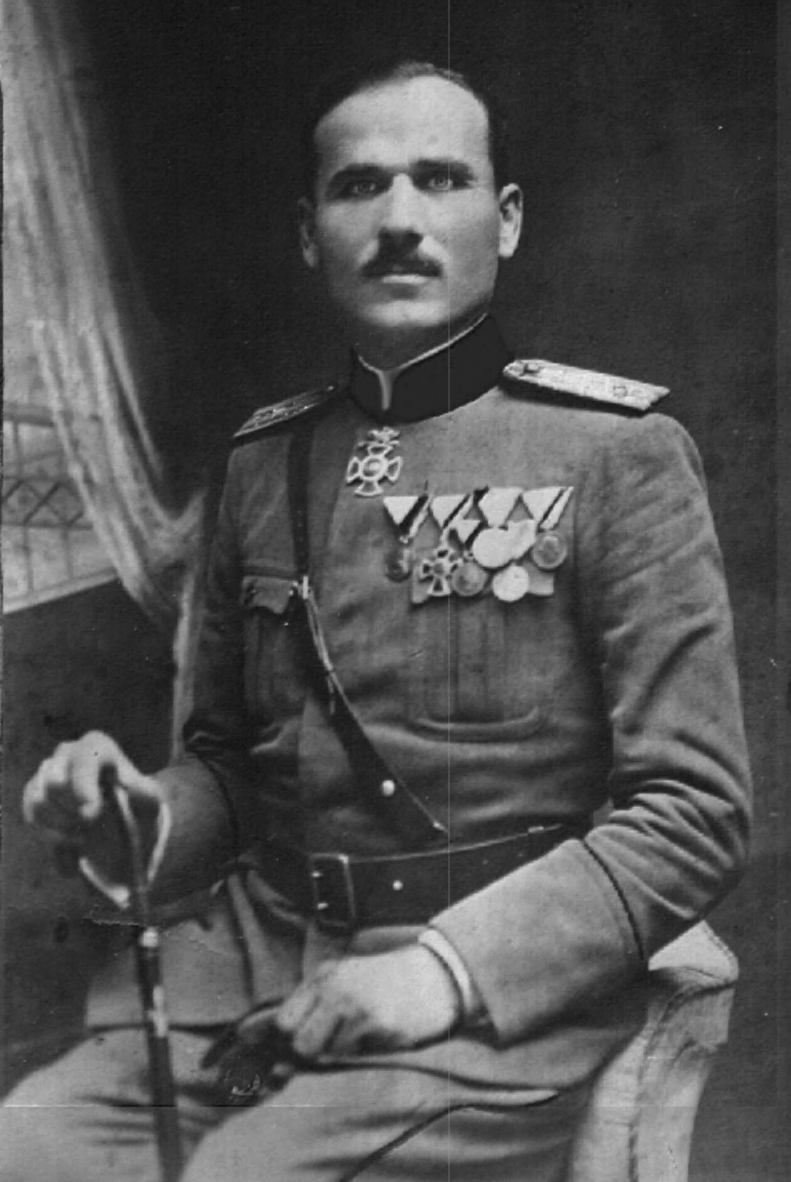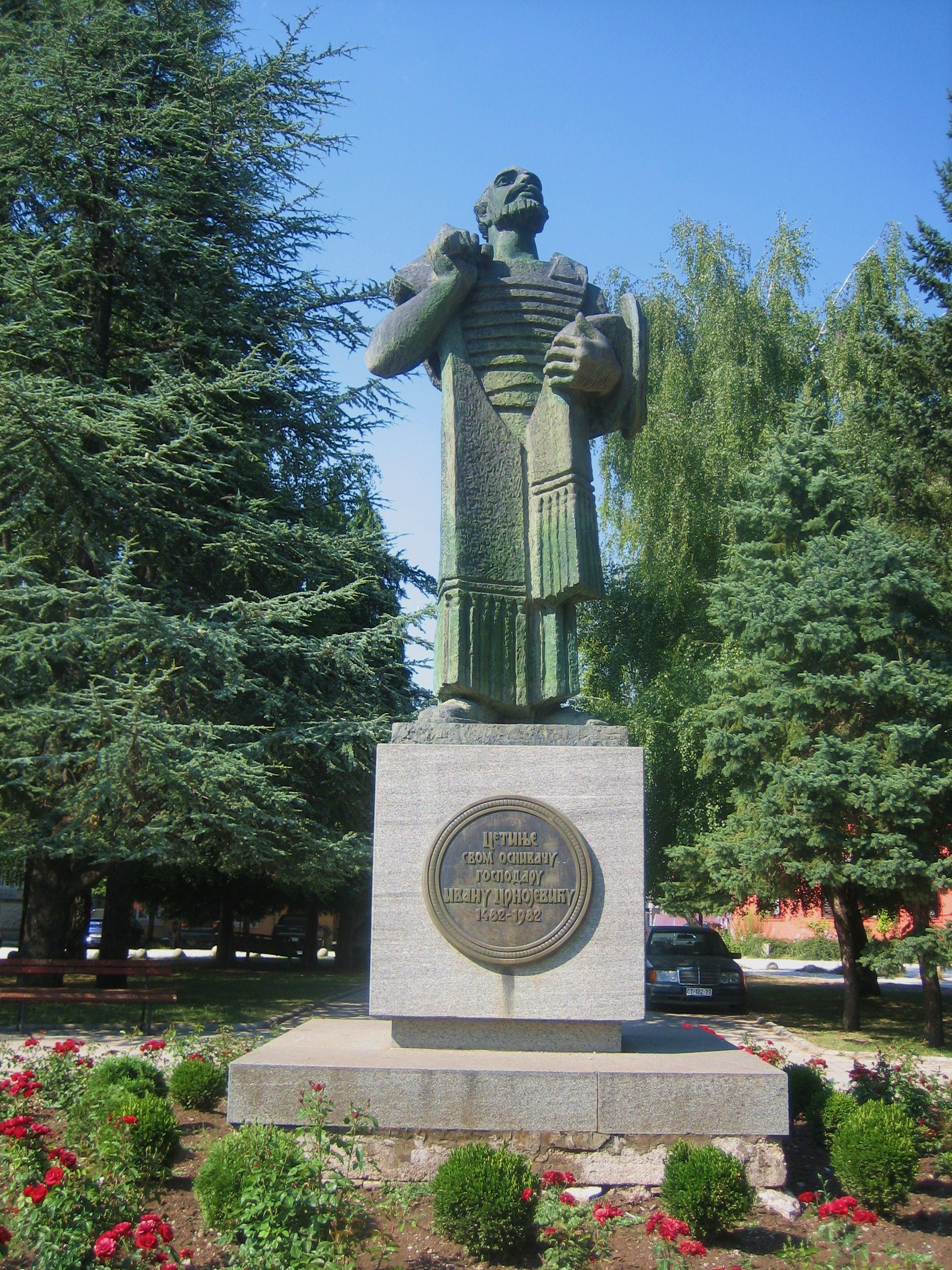|
Montenegrin Greens
The Greens ( sh-Cyrl-Latn, Зеленаши, Zelenaši) were a group of loyalists of King Nikola of Montenegro. They originated from the members of the True People's Party and were most notable for instigating the Christmas Uprising of 1919. The rebellion was staged in an attempt to prevent the dethroning of the Petrović-Njegoš dynasty and the subsequent integration of Montenegro into the Kingdom of Yugoslavia. The Greens were supporters of the House of Petrović-Njegoš, which once the house was dethroned after World War I, led the Greens to fight for the establishment of Montenegro as a province within the Yugoslav kingdom. Following their defeat in the Christmas Rebellion, the Greens continued on with their guerrilla warfare until 1929. The motto of the movement was "For the Right, Honour and Freedom of Montenegro". During World War II, the Greens were activated once again under the leadership of Krsto Popović in an attempt to re-establish the Kingdom of Montenegro as an Ax ... [...More Info...] [...Related Items...] OR: [Wikipedia] [Google] [Baidu] |
Krsto Zrnov Popovic
Krsto (Cyrillic script: Крсто), also Krste or Krǎstyo is a South Slavic masculine given name. *Krsto Papić * Krsto Ungnad *Krsto Zrnov Popović *Fran Krsto Frankopan *Vuk Krsto Frankopan *Krsto Hegedušić *Krste Crvenkovski *Krste Misirkov *Krste Velkovski *Krastyo Rakovski, a Bulgarian socialist revolutionary *Krastyo Krastev, a Bulgarian writer, translator, philosopher and public figure See also *Krastyo Sarafov National Academy for Theatre and Film Arts *Macedonian Language Institute "Krste Misirkov" *Krstić (surname) Krstić (, sr-cyr, Крстић) is a Serbian surname, a patronymic derived from the given name ''Krsta'' or '' Krsto''. It may refer to: * Aleksandar Krstić, Serbian football agent and a former footballer * Bilja Krstić, Serbian singer * Denko ... {{given name Croatian masculine given names Bulgarian masculine given names Serbian masculine given names Macedonian masculine given names ... [...More Info...] [...Related Items...] OR: [Wikipedia] [Google] [Baidu] |
Ivo Banac
Ivo Banac (; 1 March 1947 – 30 June 2020) was a Croatian-American historian, a professor of European history at Yale University and a politician of the former Liberal Party in Croatia, known as the Great Bard of Croatian historiography. , Banac was a consultant for the Bosnian Institute. He died after a serious illness at age 73. Biography Banac was born in Dubrovnik in 1947. In 1959 he emigrated to the United States with his mother, reuniting with his father who had escaped from Yugoslavia in 1947. After his father's death in a traffic accident a year later, Ivo lived with his mother in New York City, where he studied history at Fordham University, graduating in 1969. In the same year Banac moved to California, where he obtained M.Sc. and Ph.D. degrees from the Stanford University. Although he was a member of Students for a Democratic Society, by his own account he was not attracted by the West Coast flower power movement of the late 1960s. Banac worked at the Stanford Univers ... [...More Info...] [...Related Items...] OR: [Wikipedia] [Google] [Baidu] |
World War II
World War II or the Second World War, often abbreviated as WWII or WW2, was a world war that lasted from 1939 to 1945. It involved the vast majority of the world's countries—including all of the great powers—forming two opposing military alliances: the Allies and the Axis powers. World War II was a total war that directly involved more than 100 million personnel from more than 30 countries. The major participants in the war threw their entire economic, industrial, and scientific capabilities behind the war effort, blurring the distinction between civilian and military resources. Aircraft played a major role in the conflict, enabling the strategic bombing of population centres and deploying the only two nuclear weapons ever used in war. World War II was by far the deadliest conflict in human history; it resulted in 70 to 85 million fatalities, mostly among civilians. Tens of millions died due to genocides (including the Holocaust), starvation, ma ... [...More Info...] [...Related Items...] OR: [Wikipedia] [Google] [Baidu] |
Novica Radović
Novica Radović (Serbian Cyrillic: Новица Радовић; born in Martinići in 1890 – died in Cetinje in 1945) was a Montenegrin politician. Radović took part in 1919's Christmas Uprising on the side of the Greens, in an armed rebellion opposed to Montenegro's unconditional unification with Serbia in 1918 following the controversial Podgorica Assembly. Following the defeat of the Greens, he escaped to Albania and later to Italy, where he joined the Montenegrin Army in exile, becoming its Headquarters Intelligence supervisor. He returned to what was then the Kingdom of Serbs, Croats and Slovenes in 1925. There he was charged with crimes against the state and sentenced to twenty years of imprisonment. After serving nine years of the sentence in Zenica prison, he was released, acquitted in 1934 after the assassination of King Alexander in Marseille which ended the dictatorship. After his release from prison, Radović moved to Podgorica, where he taught private class ... [...More Info...] [...Related Items...] OR: [Wikipedia] [Google] [Baidu] |
Jovan S
{{disambiguation, surname ...
Jovan may refer to: *Jovan (given name), a list of people with this given name *Jovan, Mawal, a village on the western coastal region of Maharashtra, India *Jōvan Musk, a cologne *Deli Jovan, a mountain in eastern Serbia *Róbert Jován (born 1967), Hungarian footballer See also *Jovanka (other) *Joven (other) *Javon (other) *Jovan Hill Jovan Miguel Hill (born ) is an American Online streamer, livestreamer. A homosexual man who was bought up in a religious household, Hill began a Tumblr blog as a teenager to document his experiences. After he asked his followers to donate so t ... [...More Info...] [...Related Items...] OR: [Wikipedia] [Google] [Baidu] |
Krsto Zrnov Popović
Krsto (Cyrillic script: Крсто), also Krste or Krǎstyo is a South Slavic masculine given name. *Krsto Papić * Krsto Ungnad * Krsto Zrnov Popović *Fran Krsto Frankopan * Vuk Krsto Frankopan * Krsto Hegedušić *Krste Crvenkovski *Krste Misirkov *Krste Velkovski *Krastyo Rakovski, a Bulgarian socialist revolutionary *Krastyo Krastev, a Bulgarian writer, translator, philosopher and public figure See also *Krastyo Sarafov National Academy for Theatre and Film Arts *Macedonian Language Institute "Krste Misirkov" *Krstić (surname) Krstić (, sr-cyr, Крстић) is a Serbian surname, a patronymic derived from the given name ''Krsta'' or '' Krsto''. It may refer to: * Aleksandar Krstić, Serbian football agent and a former footballer * Bilja Krstić, Serbian singer * Denko ... {{given name Croatian masculine given names Bulgarian masculine given names Serbian masculine given names Macedonian masculine given names ... [...More Info...] [...Related Items...] OR: [Wikipedia] [Google] [Baidu] |
Drobnjaci
Drobnjaci (, ) are historical tribe and region, Drobnjak, in Old Herzegovina in Montenegro (municipalities from Nikšić to Šavnik, Žabljak and Pljevlja). Its unofficial centre is in Šavnik. The Serb Orthodox families have St. George (''Đurđevdan'') as their patron saint (''slava'') and the majority of Drobnjak churches are devoted to St. George as well. Families of distant Drobnjak origin are present in all former Yugoslav republics and in Hungary and Hungarian populated parts of Romania and Slovakia where it is spelled in its magyarised form as Drobnyák. History Origin and early history According to Serbian historian Andrija Luburić (1930), by oral tradition their origin was from Travnik in Bosnia and Herzegovina, and initially were called as ''Novljani''. First mention of the name was in 1285 Ragusan document, where was mentioned ''Vlach'' Bratinja Drobnjak. Term Vlach has germanic root ''walh'' meaning ''foreigner''. The surname probably derives from tribal or regio ... [...More Info...] [...Related Items...] OR: [Wikipedia] [Google] [Baidu] |
Cuce
Cuce (Cyrillic: Цуце, ) is a historical tribe (''pleme'') and region in Montenegro, located in the area of the Katunska nahija from Old Montenegro. History The toponym ''Cuce'' is first mentioned in 1431 in documents from Kotor, then again in a chrysobull of the Cetinje Monastery from the end of the 15th century. In Ottoman defters from 1521 and 1523, Cuce is mentioned as a village. The majority of inhabitants migrated to Cuce in the 16th and 17th century, from Old Herzegovina and Old Kuči. In 1718, after the Peace of Passowitz, the Cuce along with 9 other tribes of the Katun nahiya, became ''de facto'' independent from the Ottoman Empire. In 1829 Bjelice struggled against Ozrinići and Cuce, two neighboring tribes, and Petar I Petrović-Njegoš sent Sima Milutinović Sarajlija and Mojsije to negotiate peace among them. Smail-aga Cengic wrote a letter in 1838 to Njegos, complaining about the Cuce who had raided Ottoman territory. Traditionally, the Vojvode (Dukes) of tri ... [...More Info...] [...Related Items...] OR: [Wikipedia] [Google] [Baidu] |
Čevo
Čevo ( sr-cyrl, Чево}), historically also known as Kčevo (Кчево), is a village in the municipality of Cetinje, Montenegro. History The village was held by the Ozrinići tribe of the Katunska nahija. Five families of the Ozrinići founded the settlement of Ozrinići in the Nikšić area in 1657. Demographics Notable people * Milena Vukotić (1848–1923), Queen consort of Montenegro *Janko Vukotić Janko Vukotić ( sr-cyr, Јанко Вукотић; 18 February 1866 – 4 February 1927) was a Montenegrin serdar, general in the armies of the Principality and Kingdom of Montenegro in the Balkan Wars and World War I. Biography Vukotić was b ... (1866–1927), Montenegrin politician and general. * Vasilija Vukotić (1897–1970), Montenegrin military heroine of World War I References {{DEFAULTSORT:Cevo Populated places in Cetinje Municipality ... [...More Info...] [...Related Items...] OR: [Wikipedia] [Google] [Baidu] |
Cetinje
Cetinje (, ) is a town in Montenegro. It is the former royal capital (''prijestonica'' / приjестоница) of Montenegro and is the location of several national institutions, including the official residence of the president of Montenegro. According to the 2011 census, the town had a population of 14,093 while the Cetinje Municipality had 16,657 residents . Cetinje is the centre of Cetinje Municipality. The city rests on a small karst plain surrounded by limestone mountains, including Mount Lovćen, the legendary mountain in Montenegrin historiography. Cetinje was founded in the 15th century and became a cradle of the culture of Montenegro. Its status as the honorary capital of Montenegro is due to its heritage as a long-serving former capital of Montenegro. Name In Montenegrin, Bosnian, Croatian, and Serbian, it is known as ''Cetinje'' (archaically Цетинѣ / ''Cetině''); in Italian as ''Cettigne''; in Greek as Κετίγνη (''Ketígni''); in Turkish as ''Çetine ... [...More Info...] [...Related Items...] OR: [Wikipedia] [Google] [Baidu] |
Rovčani
The Rovčani ( sr-Cyrl, Ровчани, ) are a historical tribe of Montenegro and one of the seven highlander tribes of the Brda region, alongside the Bjelopavlići, Piperi, Kuči, Bratonožići, Moračani and Vasojevići. The historical region that they inhabit is called Rovca ( sr-Cyrl, Ровца, ). Etymology The Rovčani owe their name to the region that they inhabit, called Rovca, which is derived from Slavic ''rov'', meaning “dent” or “trench”. Geography Rovca borders the historical regions and tribes of the Moračani to the east, the Drobnjaci to the north, the Nikšići to the west, the Bjelopavlići to the southwest, the Piperi to the south, and the Bratonožići to the southeast. Rovca consists of the following villages: Višnje, Velje Duboko, Liješnje, Cerovica, Međuriječje, Mrtvo Duboko, Sreteška Gora, Gornja Rovca, Vlahovići and Trmanje. History The region of Rovca is first mentioned in the 1477 ''defter'' (tax registry) of the Sanjak of Herzego ... [...More Info...] [...Related Items...] OR: [Wikipedia] [Google] [Baidu] |



